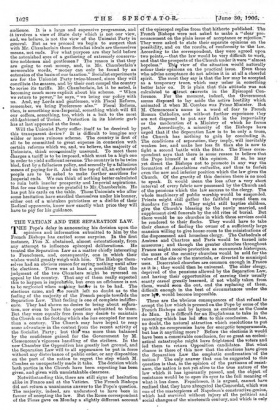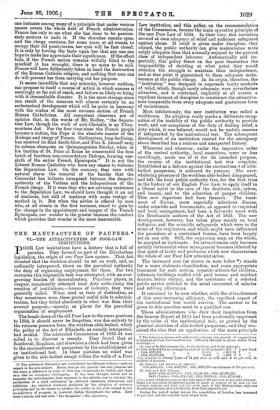THE VATICAN AND THE SEPARATION LAW.
rilHE Pope's delay in announcing his decision upon the 1 opinions and information submitted to him by the French Bishops has excited some surprise. In the first instance, Pius X. abstained, almost ostentatiously, from any attempt to influence episcopal deliberations. He treated the Separation Law as a matter chiefly interesting to Frenchmen, and, consequently, one in which their wishes would greatly weigh with him. The Bishops them- selves had an obvious reason for saying nothing until after the elections. There was at least a possibility that the judgment of the two Chambers might be reversed on appeal by the country. That any of them really expected this to happen is improbable, but even an offchance is not to be neglected when nothing better is to be had. The elections came, and the result left no doubt as to the feeling of the majority of the French people towards the Separation Law. That feeling is one of complete indiffer- ence. They had shown no desire to bring about sellara- tion, nor even to have the question submitted to them. But they were equally free from any desirb to maintain the Church on the footing which she has occupied for more than a century. The Church may have hoped to reap some advantage in the contest from the recent activity of the Socialist Party ; but -ad? was more than balanced by the confidence gained for the Government by M. Clemenceau's vigorous handling of the strikers. In the new Chamber the Opposition has greatly lost ground, and the Separation Law will to all appearance be put in force without any disturbance of public order, or any disposition on the part of the nation to regret the step which M. Combes so unexpectedly made it take. The decision which both parties in the Church have been expecting has been given, and given with unmistakable clearness.
Notwithstanding this, there are still signs of hesitation alike in France and at the Vatichn. The French Bishops did not return a unanimous answer to the Pope's question. The majority, indeed, are understood to have been in favour of accepting the law. But the Rome correspondent of the Times gave on Monday a slightly different account of the episcopal replies from that hitherto published. The French Bishops were not asked to make a "clear pro- nouncement on the plain issue of acceptance or rejection." They-were asked to state their separate opinions on the possibility, and on the results, of .conformity to ' the 'law. According to the correspondent, they were agreed upon two points,—that the law would be very difficult to work, and that the prospects of the Church under it were " almost hopeless." Thif view of the situation would naturally colour their opinions on the practical issue. Even those who advise acceptance do not advise it in at all a cheerful spirit. The most they say is that the law may be accepted. as a temporary truce, which may usher in something better later on. It is plain that this attitude was not calculated to 41tract converts in the Episcopal -Con- ference. For the moment, indeed, the Government seems disposed to 'lay aside the active hostility which animated it when M. Combos was Prime Minister. But M. Clemenceau's name is a word of fear to French Roman Catholics, and without further experience they are not disposed to put any faith in the impartiality or the moderation of a Ministry of which he forms part. Accordingly, a minority of the Bishops have urged that if the Separation Law is to be only a truce, the Church has nothing to gain by concluding it. The conditions of separation, they imply, will inevitably weaken her, and make her less fit than she is now to fight a second battle with the State. The Times corre- spondent says that there is some reason to believe that the Pope himself is of this opinion. If so, he may vet direct the Bishops not to promote in any way the 'formation of Associations cultuelles, and thus to forfeit even the new and inferior position which the law gives the Church. Of the gravity of this decision there is no need to speak. It would mean the loss after a very short interval of every fabric now possessed by the Church and of the pensions which the law secures to the clergy. The whole machinery of public worship would be suspended. Priests might still gather the faithful round them on Sundays for Mass. They might still baptise children, give the Church's blessing to the newly married, and supplement civil funerals by the old rites of burial. But there would be no churches in which these services could be rendered to their flocks. They would have to take their chance of finding the owner of a sufficiently large mansion willing to give houseroom to the ministrations of the dispossessed and homeless clergy. The Cathedrals of Amiens and Chartres and Paris would be turned into museums ; and though the greater churches throughout France might receive protection as monuments historiques, the mass of the country churches would be sold for the value of the site or the materials, or diverted to municipal uses. Desecrated churches are common enough in France as it is ; they would then be universal. The older clergy, deprived of the pensions allowed by the Separation Law, and having their opportunities of earning their usually scanty casuel greatly lessened, if not wholly taken from them, would Boon die out, and the replacing of them, difficult enough in the best of circumstances under the new hit, would become impossible.
These are the obvious consequences of that refusal to accept the law which is pressed. on the Pope by some of the French Bishops and by laymen as eminent as the Comte de Mun. It is difficult for an Englishman to take in the reasoning which has led. den to this conclusion. It has, no doubt, the natural attraction which resolutions to put up with no compromise have for energetic temperaments, but has it anything more ? Before the elections it would have been a conceivable conclusion, for so great an ecclesi- astical catastrophe might have frightened the voters and led them to return Opposition candidateS. But what chance is there of this now that the elections have given the Separation Law the emphatic confirmation 'of the nation ? The only answer that can be suggested to this question is that, in the opinion of the partisans of resist- ance, the nation is not yet alive to the true nature of the law which it has ignorantly passed, and, the object of resistance would be to open its eyes to the full meaning of what it has done. Frenchmen, it is argued, cannot have realised that they have abrogated the Concordat, which was one of the masterpieces of Napoleon's constructive,genius, which had survived without injury all the political and social changes of the nineteenth century, and which is only one instance among many of a principle that under various names, covers the whole field of French administration. France has only to see what she has done to be passion- ately anxious to undo it. If the churches remain open, and the clergy continue, for some years at all events, to occupy their old presbyteries, her eyes will be fast closed. It is only by forcing the facts upon her that any one can hope to make her appreciate their significance. If the effort fails, if the French nation remains wilfully blind to the mischief it has wrought, there is no more to be said. France will have. deliberately taken in hand the destruction of the Roman Catholic religion, and nothing that men can do will prevent her from carrying out her purpose.
It seems incredible that any minority, however reckless, ca,n propose to itself a course of action in which success is seemingly so, far out otreach, and failure so likely to bring with it irremediable disaster. It is the more strange since one result of the measure will almost certainly be an ecclesiastical development which will be quite in harmony with the wishes of the most extreme section of French Roman Catholicism. All competent observers are of opinion that, in the words of Mr. Bodley, " the Separa- tion Law, though the work of anti-Clericals, is an Ultra- montane Act. For the first time singe the French people became a nation, the Pope is the absolute master of the Bishops and clergy-of France. Gallicanism, long declining, has received its final death-blow, and Pius X. himself sang its solemn obsequies on Quinquagesima Sunday, when in his basilica of St. Peter at Rome he consecrated the first batch of fourteen non-concordatory Bishops, forming one- sixth of the entire French Episcopate." It is not the Liberal Roman Catholics who have any reason to welcome the Separation Law. On the contrary, they view with natural alarm the removal of the barrier that the Concordat has hitherto interposed between the despotic authority of the Vatican and the independence of the French clergy.. If it were they who are advising resistance to the Separation Law, we should have thought it an act of madness, but still of madness with some vestige of method in it. But when the advice is offered by men who, at all events, in the first instance, stand to gain by the change in the appointment and temper of the French Episcopate, our wonder is the greater because the conduct which provokes that wonder is the more inexcusable.



























































 Previous page
Previous page